Dollar Store Items Wholesale: The Ultimate Guide to Sourcing from China (2025)
Who This Guide Is For
If you run a dollar store ($1 shop), variety shop, discount chain, flea-market stall, online store, supermarket or you want to know step-by-step how to source and import products (including dollar items) from China to your country in detail, this guide is for you.
This is a no-fluff, practical guide for anyone buying for a retail network, big or small. We’ll walk you through exactly where to find products in China (both offline and online), how to compare suppliers, what pitfalls to avoid, and share simple checklists you can use right away.
Quick Jump to The Topic You Are Interesting in by Click Below Highlighted Headings:
- Understanding “Chinese Dollar Store Wholesale”
- Quick Picks: The Best Sourcing Options for Your Situation
- Why Source Dollar-Store Products from China?
- Part A: Offline Sourcing – Visiting China’s Wholesale Markets
- Part B: Online Sourcing – The Best Wholesale Websites
- The Playbook: Building a Profitable Dollar-Store Assortment
- Pricing & Negotiation: Insider Tips for a Better Deal
- Quality & Risk Control: How to Avoid Costly Mistakes
- Shipping 101: A Simple Guide to Getting Your Goods Home
- Your First Order: A 30-Day Action Plan
- Frequently Asked Questions (FAQs)
- What’s Your Next Step?
What “Chinese Dollar Store Wholesale” Actually Means
When people use this phrase, they’re usually talking about two different things:
- Offline Wholesale Markets in China: These are giant, city-sized trade centers filled with thousands of booths where factories and trading companies show their samples. You visit in person, choose the products, negotiate face-to-face, and place your orders.
- Online Wholesale Websites: These are the B2B platforms like Alibaba that allow you to browse millions of products and source from verified suppliers without flying to China.
This guide covers both. By the end, you’ll be able to choose the sourcing strategy that best fits your budget, timeline, and comfort level with risk.
Quick Picks: Best Options by Situation
| Your Situation | Best Starting Point | Why It Works |
|---|---|---|
| First time buying from China, small budget | Alibaba (Online, International) | English interface, Trade Assurance, huge selection |
| Very low-price targets, can handle Chinese-only chat or hire an agent | 1688 (Online, Domestic) | Factory-level pricing, wider low-cost options. You’ll need a sourcing agent as it’s Chinese-only. |
| You need cheap electronics & accessories | Shenzhen Huaqiangbei (Offline) | The electronics hub; perfect for phone cases, cables, and gadgets. |
| Dollar-store mix (toys, gifts, kitchen, stationery) | Yiwu International Trade Market (Offline) | The world’s largest market for small commodities. You can build an entire store from here. |
| You focus on fashion, apparel, or accessories | Guangzhou markets (Baima/Shahe, etc.) | The heart of China’s fast-fashion supply chain. Great for volume buys. |
| You want curated, vetted B2B suppliers | Global Sources / HKTDC / Made-in-China | These platforms often have more established factories and integrate with trade shows. |
| You just want to place small test orders | AliExpress, DHgate | Ideal for testing a product with very small MOQs before committing to a larger order, buyer protection (prices higher) |
| You prefer meeting suppliers face-to-face | Canton Fair (Guangzhou) | China’s flagship and most famous trade fair, 3 phases by category. A great way to meet many suppliers in one place. |
*if you are reviewing this comparison table via a mobile phone and the table doesn’t display completely, simply swipe the table to the right to see the rest.
Why Buy Dollar-Store Products from China?
- Low Landed Cost: The competitive factory pricing, particularly for simple items, is the core reason it’s profitable. Your final landed cost (the total price to get a product to your warehouse) is often a fraction of what you’d pay domestically.
- Endless Variety: a massive range of fast-moving products across every category imaginable: toys, stationery, kitchenware, party supplies, seasonal décor, hardware, and beauty accessories. Especially in Yiwu Market, more than 75,000 suppliers here providing endless variety in dollar store items with very good prices.
- Low MOQ for Small Businesses: While some factories require huge orders, many suppliers offer a flexible or low MOQ (Minimum Order Quantity). This makes importing from China for a small business not just possible, but profitable. Especially in Yiwu Market, suppliers here offer as low as 1 carton (even half carton) for dollar store products, select more yet pay less.
- Custom Packaging & Private Label: You can easily get custom packaging to match your store’s branding. Need your own barcode, inner pack counts for your shelves, or specific carton markings? It’s all standard practice.
Common watch-outs: Be aware of quality variations between suppliers, packaging compliance for your country, and mandatory lab testing for certain products (like CPSIA for toys sold in the U.S.), and last-mile delivery timelines during peak season.
Part A — Offline: China’s Core Dollar Store Products Wholesale Markets
1) Yiwu International Trade Market / Yiwu Futian Market (Zhejiang)
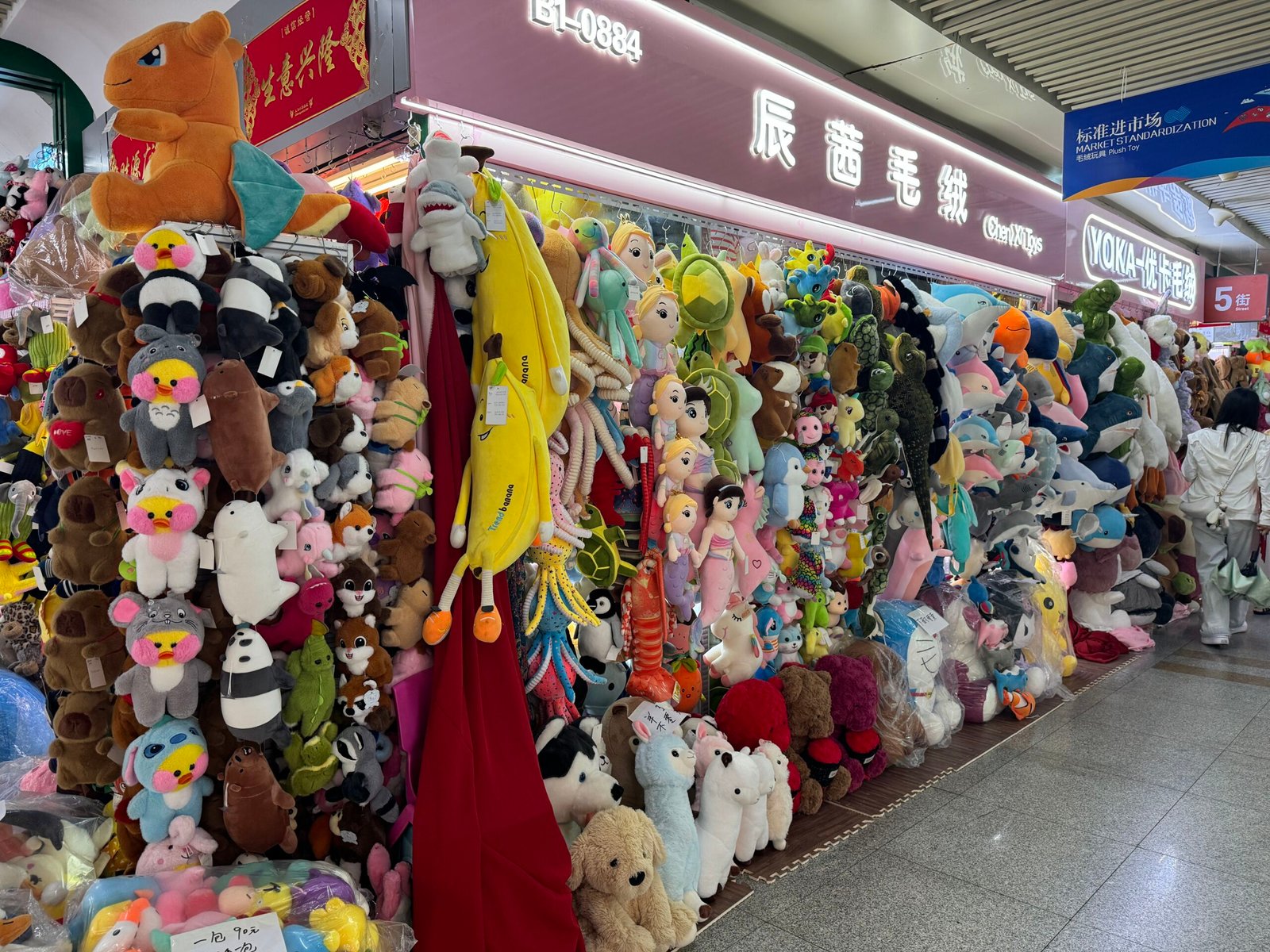
Colorful plush toy and stuffed animal display at a wholesale vendor stall in Yiwu International Trade Market, China. The shop features hundreds of cute stuffed animals including teddy bears, pandas, cartoon characters, and novelty plush toys arranged from floor to ceiling, showcasing the diverse wholesale toy offerings available at the world’s largest small commodity market. Plush toy is a good item for dollar store.
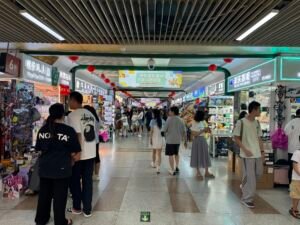
Inside Yiwu Toy Market corridors – China’s largest toy wholesale district with thousands of toy suppliers. Browse anime figures, drones, educational toys, trending toys and novelties from verified manufacturers.
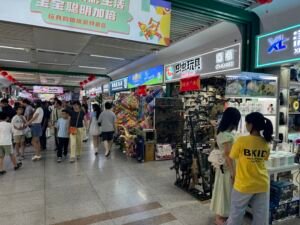
Inside Yiwu Toy Market – Discover China’s largest toy wholesale hub featuring action figures, model toys, and collectibles. Connect directly with verified toy manufacturers. Good for dollar stores
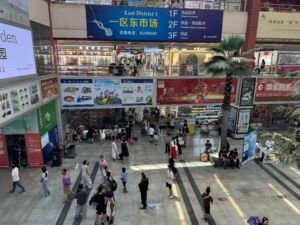
Explore Yiwu International Trade Market District 1 – China’s largest toys wholesale hub. Discover millions of toy suppliers, manufacturers & exporters in one location. Visit the world’s toy capital. Best place for dollar store
* Yiwu Market is the best wholesale market I recommend, low MOQ yet cheap prices, and millions of items you can choose from. Read this blog that shows you a full image of Yiwu Dollar Store Items Wholesale Market. (By click here to redirect to this post)
Best for: Dollar-store assortments, gifts, toys, stationery, household, kitchen tools and party supplies.
Why go: It’s so vast you can literally plan your entire store’s layout in one trip. The selection of ready-to-ship goods is unmatched.
Tips: Bring a barcode/packing spec sheet; ask for quotes with several suppliers; Take photos of every sample along with the booth number and business card.; confirm inner pack and carton pack to avoid freight surprises.
Insider Tip: The Power of WeChat
In China, business relationships run on WeChat. Download / install it before your trip. It’s the fastest way to get quotes, confirm details with a quick photo, and build real connections (guanxi). A quick video call from a supplier’s booth can often tell you more than a dozen emails.
2) Guangzhou Wholesale Clusters (Guangdong)
Best for: Apparel, fashion accessories, handbags, footwear / shoes and textiles.
Hot spots: Baima & Shahe clothing markets, Zhanxi leather/bags, OneLink Plaza (gifts, crafts and toys).
Tips: Fashion cycles are incredibly fast here. Confirm the exact size and color assortment per carton before signing the Proforma Invoice (PI).
3) Shenzhen Huaqiangbei (Guangdong)
Best for: Electronics accessories (cables, chargers, earphones), gadget add-ons and components.
Tips: Product models change weekly. Always ask about the current chipsets and for required safety certifications (like CE, FCC, or UL). Insist on checking a sample from the actual production batch.
4) City-specialty Clusters to Note
- Shantou (Chenghai): Toys & RC Toys
- Foshan: Furniture & Houseware
- Wenzhou/Quanzhou: Footwear
- Pinghu: Luggage
- Yangjiang: Kitchen knives / Multifunctional Tools
5) Trade Fairs (Great for First-Timers)
- Canton Fair (Guangzhou): China’s biggest and most famous trade fair; three phases by category (consumer goods, gifts, home décor; then tools/hardware; then textiles/apparel). You can check the official Canton Fair website to see which phase covers your product categories.
- Yiwu Fair: The largest fair for small commodities, strong for dollar-store variety.
- HKTDC shows (Hong Kong): Run by the Hong Kong Trade Development Council, mainly for electronics, gifts, housewares; easier English support, convenient travel.
Offline Sourcing Checklist
- Prepare target price bands ($0.25, $0.50, $1 landed) and required retail (e.g., $1.25/$1.50/$3).
- Print your barcode & packaging SOP (including barcode type UPC/EAN, inner packs, master carton).
- Bring a tape measure and portable digital scale; photograph every sample with supplier’s booth sign + business card.
- Ask the same item for EXW, FOB, and CIF (this may need to check with your shipping agent) to compare true landed cost.
- Book a pre-shipment inspection (if you have a sourcing agent, they will handle this job for you) before balance payment.
Part B — Online: The Main Wholesale Websites
Your goal should be to find 3-5 potential suppliers for each product, get samples, compare, and then negotiate.
Alibaba (International)
- Good for: Most global buyers, especially those new to sourcing.
- Pros: It’s in English interface, offers Trade Assurance (which protects your payment), and has a massive catalog.
- Cons: You’ll find both factories and trading companies, so pricing can vary. You must vet each supplier profile carefully.
- Do this: Always use Trade Assurance for payment. Request spec sheets, test reports, and clear packaging photos before placing an order.
1688 (Domestic)
- Good for: Achieving the lowest possible factory-direct pricing.
- Pros: This is Alibaba’s domestic site for the Chinese market, so prices are often much lower.
- Cons: It’s entirely in Chinese, and most sellers only ship within China.; need an agent or Chinese support.
- Do this: You’ll need to work with a reliable sourcing agent in China. An agent acts as your boots on the ground—they can be your translator, negotiator, and quality control team, and can consolidate your goods for export, and the most important is for customs clearance paperwork. A good buying agent can save you lots of time.
Global Sources / Made-in-China / HKTDC
- Good for: Buyers looking for a more selective list of suppliers / factories.
- Pros: Tighter vetting process; trade-show tie-ins; category depth.
- Cons: sometimes higher MOQ than on Alibaba; fewer micro-suppliers.
- Do this: cross-check years in business, major buyers, and if they have factory audit reports (like BSCI or Sedex) available and it’s status.
AliExpress / DHgate
- Good for: Very small orders and testing new product ideas.
- Pros: You can buy single pieces or just a few cartons. Buyer protection is strong.
- Cons: The unit cost is much higher, making it unsuitable for true wholesale sourcing; inconsistent packaging for retail.
- Do this: Treat as sample pipeline—once a SKU works, migrate to Alibaba / 1688 suppliers or Yiwu Market dollar store items wholesalers.
Building A Dollar Store Assortment: A Simple Playbook
Focus On High-velocity Categories
- Kitchen & Cleaning: Sponges, scrubbers, microfiber cloths, foil, storage hooks.
- Party & Seasonal: Balloons, streamers, gift bags, holiday décor.
- Stationery & Crafts: Pens, fountain pens, gel pens, notebooks, stickers, glue sticks.
- Toys & Novelty: Small puzzles, slime, bouncy balls, yo-yos, fidget toys.
- Health & Beauty Accessories: Hair ties, nail files, travel bottles, brushes.
- Hardware Basics: Zip ties, tape, picture hooks, work gloves.
Spec and Pack Rules (keep your freight low and shelves happy)
- Inner Pack: Counts aligned to shelf width (e.g., 6, 12 or 24 units).
- Master Carton: Keep your master carton size manageable for your warehouse staff (often under 0.1 CBM).
- Barcodes: Provide your UPC/EAN list upfront; require photo proof of CORRECT label placement.
- Instructions: Make sure any insert cards have clear English instructions and legally required warnings.
Pricing & Negotiation (Without Burning Bridges)
- Share Your Target: Be direct. Tell them, “My target landed cost for this item needs to be $0.42 to our warehouse in Ohio, 60-day lead.” This frames the negotiation around a realistic goal.
- Ask for Price Breaks: Request pricing for different volumes (e.g., one carton, one pallet, and a full container).
- Negotiate the “Freebies”: For a decent-sized order, ask for free inner-pack barcode labeling and master carton printing.
- Leverage Future Orders: If you plan to reorder, say so. “If this first order goes well, we plan to place four more this year.” This can motivate them to give you their best price now.
Insider Tip: Negotiation is Expected
Never accept the first price you’re given. Chinese suppliers expect to negotiate. Start your inquiry with a target price that is 10-15% lower than your actual goal. This gives both sides room to “meet in the middle” and allows the salesperson to feel they’ve won the negotiation.
- Use payment split (30/70) tied to pre-shipment inspection pass.
- Always get a golden sample with final packaging before mass production.
Quality, Compliance & Risk Control: How to Avoid Costly Mistakes When Buying Dollar Store Items from China?
- The Golden Sample: This is the pre-production sample that you formally approve. Use a 30% deposit / 70% balance payment term, with the final payment due only after your goods have passed a pre-shipment inspection.
- AQL Inspection: Before you pay your final balance, hire a third-party inspection company / a sourcing / buying agent to perform an AQL (Acceptable Quality Limit) inspection. This is standard practice and costs a few hundred dollars—a small price to pay to avoid thousands in defective goods.
- Compliance: Check your market rules—e.g., CPSIA/ASTM for toys in the U.S., Prop 65 warnings for California, CE/REACH for EU. Ask suppliers for existing test reports.
- Lab Tests: Specify needed tests by product (e.g., EN71 for toys, FDA contact for food-touch items).
- Claims & Labels: Beware “biodegradable,” “BPA-free,” or “FDA-approved” claims without proof.
- Packaging: Have your suppliers use the all-new and sturdy & hard cartons to pack your goods.
Red flags
- Unrealistic pricing far below market, refusal to video-call, no real factory photos, no references, or pushing to pay to a personal bank account.
Insider Tip: The “Golden Sample” is Your Contract
Don’t just approve the golden sample—document it relentlessly. Take photos from every angle, measure it, weigh it, and attach these details to your Proforma Invoice (PI). In any quality dispute, this signed PI with photos is your single source of truth.
Shipping 101 (keep it simple)
- FCL vs. LCL: Once your order size is over about 18-20 cubic meters, a full container load (FCL) is often cheaper and safer (less on damage) per unit than a less-than-container load (LCL).
- Choose the Right Port: If you’re buying from Yiwu, your port will likely be Ningbo or Shanghai. If you’re sourcing from Guangzhou or Shenzhen, your port will be in that region.
- Get a Door-to-Door Quote: Ask your freight forwarder for a DDP (Delivered Duty Paid) quote. This will give you the true, all-inclusive landed cost per unit.
- Plan for Peak Season: Shipping costs and timelines surge in Q3 and Q4 ahead of the holiday season. Book your shipments 3-5 weeks earlier than normal during this period.
Step-by-Step: Your First Dollar Items Order in 30 Days
Here is a simple China product sourcing checklist to guide you.
Week 1 – Research & Shortlist
- Define 20-30 target products and your target landed costs.
- Source 3–5 suppliers for each product on Alibaba / 1688 / Global Sources.
- Request quotes with photos, pack details, and any available test reports.
Week 2 – Samples & Specifications
- Order samples from your top 2-3 suppliers for each item.
- Compare the quality side-by-side.
- Finalize your packaging requirements (barcode, warnings, inner packs) and agree on the AQL inspection standard.
Week 3 – Negotiate & PI (Proforma Invoice)
- Negotiate the final price and payment terms. Get a detailed order list / Proforma Invoice (PI) that lists every single specification.
- Pay the 30% deposit and book your pre-shipment inspection (if you have a sourcing / buying agent, they will do it for you) for a tentative date.
Week 4 – Production & QC (Quality Control)
- Approve the final production sample (the “golden sample”) if needed, normally buy from Yiwu Market don’t really need this step.
- Once production is 100% complete, have your inspection performed. Review the report.
- If it passes, pay the 70% balance. If it fails, have the factory fix the defects and re-inspect.
- Arrange shipment, track your goods, and prepare for receiving (your agent now needs to prepare the documents for the customs clearance).
Frequently Asked Questions (FAQs)
Q1: What’s the real difference between Alibaba and 1688 when buy dollar items from China?
A: Alibaba is built for international buyers (English, easy payments). 1688 is for domestic Chinese buyers (Chinese language, lower prices). Most international buyers use a sourcing agent to access the better pricing on 1688.
Q2: Are dollar store items safe to import from China?
A: Yes, if you specify the correct materials and test where required (e.g., CPSIA for toys, food-contact rules for kitchenware) (e.g., CPSIA for toys, FDA-grade for food-contact items). Always ask for existing test reports and write your requirements into the PI.
Q3: What MOQ should I expect for dollar store items?
A: For simple, off-the-shelf items, it can be as low as a ONE carton (some suppliers even offers half carton or sell by packs, e.g hair accessories, hair band, stainless steel jewelries, copper jewelries, etc). For custom packaging or private label dollar store items, expect higher MOQ. Ask for mix-color or mix-SKU per carton when possible.
Q4: How do I avoid getting a final product that’s worse than the sample?
A: This is the “quality fade” problem. The solution is threefold: 1) Document the golden sample on your PI; 2) Use a pre-shipment AQL inspection; 3) Only pay the final balance after the inspection PASSES or negotiate with supplier to get a discount for accepting the goods if they are just not perfect but still acceptable.
Q5: Should I visit China or just source online?
A: You can absolutely start online. Once your business grows and you’re placing larger orders, a trip to Yiwu or Guangzhou can help you find better pricing, discover new items, and build much stronger supplier relationships. If you have enough experience in dollar store business, there is no doubt to make a visit in Yiwu firstly!
Q6: How do I private label my dollar store products?
A: It’s a straightforward process. You provide your logo file, packaging design (dieline), and barcode list to the supplier. Always confirm any extra costs and the impact on lead time. Insist on approving a fully packaged pre-production sample before they start the full run.
Q7: How do I calculate landed cost fast?
A: Unit price + inland freight + export docs + ocean/air + destination fees + duties + last mile to warehouse. Ask both suppliers (ExW) and forwarder (FOB, CIF or Door-to-Door) for quotes to compare.
Q8: What’s a realistic lead time?
A: Stock items (most of dollar store items): 7–15 days to ship after deposit; custom packaging: 25–35 days plus transit; add more extra time during Q3–Q4 peak.
What’s Your Next Step?
Sourcing from China can feel overwhelming, but breaking it down into these steps makes it manageable.
And if you have any questions on buying goods (dollar store items) from China, feel free to contact with us, we are very happy to help with.
Contact Information as below:
Email:kevin@china-buying-support.com
Phone | WhatsApp:+86 1860 5899 103
Thank you.
One Comment
Leave A Comment
Joining Us With 1,200+ Happy Clients Enjoying Buying From China now!
Becoming One of China-Buying-Support family to Get a Easier and Trouble-Free Sourcing and Shipping Service.

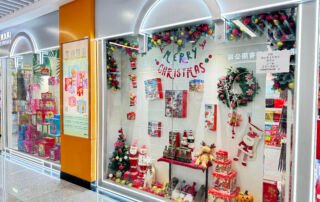
Thank you for sharing such detailed article about buying dollar shop products from China, it helps a lot!